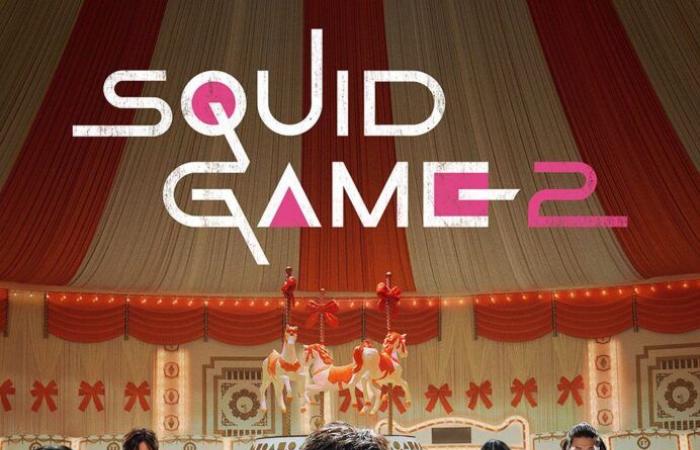Since its launch, Squid Game has captivated viewers around the world, rising to the top of Netflix productions. This series, which redefined the boundaries of the psychological thriller, returns for a second season which promises to explore new facets of human struggles with power, money and morality. So, does the sequel live up to expectations? Season 2 begins exactly where the first ended: Seong Gi-hun, the traumatized winner of the game, stands about to board a flight to reunite with his daughter. But at the last moment, he turns around, consumed by an obsession: dismantling the diabolical system that cost the lives of 454 people. Gi-hun, who one might think was appeased by his victory and his colossal gains, appears here more tormented than ever.
This bold narrative choice sets the tone: this season does not just reproduce the mechanics of the past, it deepens the scars left by these deadly games. From the first episodes, the focus is on Gi-hun’s psychological descent into hell. Living as a hermit, he devotes all his time and resources to a quest for justice. Far from the image of the classic hero, here he embodies a darker, more vulnerable figure, who reflects the lasting impact of trauma. One of the highlights of this season is the introduction of Hwang Jun-ho, the police officer once undercover in the games. Although he barely survived, his quest to uncover the truth marginalized him.
By joining forces, Gi-hun and Jun-ho form an atypical duo, ready to dive back into this nightmare to destroy its source. Their dynamic, marked by tensions and sometimes divergent interests, adds narrative richness to the plot. But this alliance is not enough to make the task easy. The organizers of the game, whom Gi-hun thought he could reach with his financial resources, prove to be more elusive and cruel than ever. The two protagonists find themselves sucked back into the arena, confronted by a system where every decision seems calculated to maximize human suffering. One of the most intriguing elements of this season is the arrival of new participants.
Unlike the first season, where the majority of players were adults burdened by debt, this time around, the cast reflects a diversity of backgrounds and motivations. We discover a touching mother-son duo, an influencer with naive ambitions, and even a controversial rapper, each embodying a facet of modern societal pressures. These additions allow the series to explore current issues such as the precariousness of young people facing unstable cryptocurrencies, the impact of social networks and even unplanned pregnancies. This choice only enriches the social criticism which constitutes the DNA of the series. Where season 1 focused almost exclusively on the players, this new iteration lifts the veil on another crucial part of the system: the soldiers in pink.
These anonymous figures, once perceived as simple instruments of violence, reveal themselves to be individuals with their own motivations and dilemmas. The story of No-eul, one of these guardians, is particularly striking. It shows how ordinary people can become complicit in extreme cruelty when they feel empowered. This in-depth exploration of the universe of Squid Game is one of the major successes of the season. It demonstrates that violence is not limited to the arena; it permeates every corner of the system. What really sets this season apart is its ability to reflect the fractures in our contemporary society.
Under its dystopian appearance, Squid Game acts as a distorting mirror of very real problems: capitalist exploitation, the erosion of human values and the growing disparities between social classes. The show goes even further in its criticism of elites. The organizers of the game, far from remaining fixed in their methods, are doubling their ingenuity to maintain their hold. This chilling observation illustrates the extent to which inequalities are perpetuated by mechanisms that are constantly evolving. Visually, the series retains its unique touch: vibrant settings contrasting with the darkness of the events, iconic costumes and blood-curdling music.
However, some elements suffer from redundancy. The tests, although always brutal and inventive, sometimes lack the element of surprise which so marked the first season. In addition, the season sometimes gives the impression of preparing the ground for the future, to the detriment of its own development. Certain narrative arcs are sketched without being fully exploited, leaving a feeling of unfinished business. The final episode ends on a bold cliffhanger, promising an explosive conclusion in the next season. While this strategy captivates the audience, it can also frustrate with its lack of resolution.
However, despite these few weaknesses, Squid Game remains a work of rare intensity, capable of provoking both chills and deep reflections. The second season of Squid Game achieves the feat of deepening its universe while keeping intact its harsh criticism of societal excesses. Although it sometimes lacks audacity in its development, it offers moments of undeniable emotional and narrative power. For those who were marked by the first season, this sequel is an essential step, both fascinating and disturbing.
Note : 7/10. In short, a new season richer, more intense and ultimately better than season 1.
Available on Netflix
Netflix has already renewed Squid Game for a season 3.






